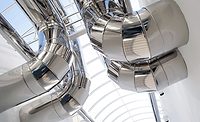Proactive routine air sampling will detect viable airborne particles and establish typical microbial reference data. Counts above that baseline may instigate an investigation and subsequent corrective actions. An important application is within controlled areas such as a food or beverage testing laboratory.
There are consequences in higher-than-typical airborne microbial counts. Furthermore, cultural methods may be contaminated, possibly causing higher counts in test results or false positives.
Other critical reasons exist for sampling air in a processing environment as well:
• Verify that air-handling systems are working properly
• Verify that systems are working as designed
Factors to keep in mind in while air sampling in a plant:
• Distance a sample is taken from the floor; from intake and outlet vents
• Personnel movement
• The presence of running water and drains
• Equipment operation
• Dry ingredient handling
The RCS® air sampler delivers reliable and reproducible results. It operates on impaction principle, drawing airborne microorganisms onto an agar media strip for later incubation and analysis. Using a centrifugal motion, the sampler draws sample at 40 L per minute and can be set at sampling volumes of 20, 40, 80, 160 and 320 L for 0.5, 1, 2, 4 or 8 minutes, with a sampling accuracy of less than or equal to 2 percent. This precision allows for quantification of the number of colonies per unit volume of air.
Together with standardized, ready-to-use and certified HYCON® Agar Strips, the factory-calibrated RCS air samplers provide a complete system that is fully validated according to ISO 14698-1.
This is a well-established and significant improvement over primitive sedimentation Petri dishes or films. Sedimentation plates are simply exposed to the atmosphere over a controlled period of time and collect whatever settles by gravity. It is an inexact method that is overrepresented by larger particles. Results are nonvolumetric and impossible to validate.
The sampler has a rugged housing made of chrome-plated brass with an autoclavable, aluminum impeller blade and drum. It is lightweight, battery operated and has a compact design that is designed for portability and ease of use. Horizontal or vertical installation is possible, up to heights of 3 m. A number of user-defined sampling options include individual volumes, time delay or interval sampling.
A number of useful optional accessories are available, including:
• Floor plate for use in an upright position
• Tripod for use at heights up to 3 m (9.8 ft)
• Calibration set for verifying and correcting the angle of the impeller blade
• Power supply for 110–240 V
HYCON® strips are individually packaged to ensure sterility and can be stored at room temperature. Media are available for a variety of applications. There is also a blank strip kit that are empty strips for the manual production of culture media, if you want to make your own or need a formulation that isn’t premade. An advantage of these strips is that colonies recovered from the manufacturing area can be readily picked for taxonomy. Agars include the following:
• Tryptic Soy Agar for total count
• Modified Tryptic Soy Agar with neutralizers against disinfectants and growth supplements for identification of the total count of fastidious and sublethally damaged microorganisms
• Rose Bengal Agar with streptomycin
• SDX (Sabouraud Dextrose Agar) with modified Pharmacopoeia or Dichloran Glycerol Agar for the determination of yeasts and molds
• Mannitol Salt Agar for determination of staphylococci
• MacConkey Agar for determination of coliform bacteria
The RCS® system is made by EMD Millipore and is distributed by Weber Scientific.
p>


